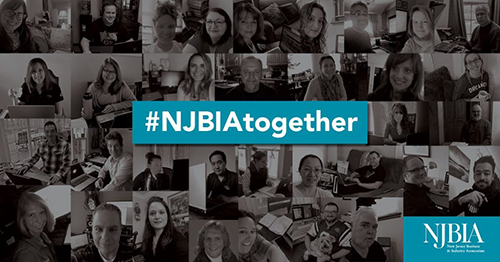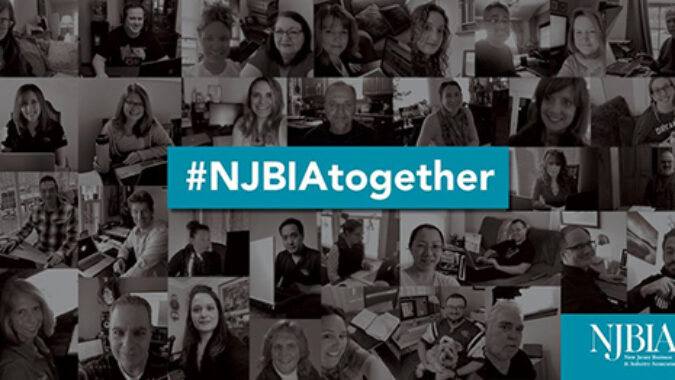As New Jersey businesses face unprecedented challenges brought on by the coronavirus pandemic, NJBIA is highlighting some of the unique and uplifting ways NJBIA members are responding across the state. Share your good news story with us on social media at #NJBIAtogether or email us at communications@njbia.org.
COMCAST Extends COVID-19 Response Policies to June 30
 Comcast says it will extend its no-disconnect policy and other COVID-19 response commitments to Xfinity customers through June 30 to help ensure that students whose schools are closed can finish out the school year from home and remain connected to the internet.
Comcast says it will extend its no-disconnect policy and other COVID-19 response commitments to Xfinity customers through June 30 to help ensure that students whose schools are closed can finish out the school year from home and remain connected to the internet.
The now-extended commitments that were originally announced March 13 include:
- No disconnects or late fees for customers who use Xfinity Internet, Xfinity Mobile or Xfinity Voice service if they cannot pay their bills during this period. Customers are asked to contact Comcast to set up flexible payment options or other solutions.
- Free Xfinity Wi-Fi hotspots in business areas and other outdoor locations that are available to anyone – including non-Xfinity Internet subscribers. For a map of Xfinity Wi-Fi hotspots, visit https://wifi.xfinity.com
- Unlimited data at no additional charge so that Xfinity customers working from home and students doing online classwork do not have to worry about exceeding a data plan.
- Complimentary Internet Essentials service for new low-income customers through June 30. Internet Essentials is normally available to all qualified low-income households for $9.95 a month. For more information, go to https://www.internetessentials.com.
“These extended measures will continue to keep Americans safe and ensure that households are equipped for students to learn and stay informed at home as the nation copes with this unprecedented disruption to our daily lives,” said Dave Watson, CEO of Comcast Cable. “Our services have never been more important, and we’re doing everything we can to keep people connected to the internet.”
Hamilton Jewelers Creates Online Auction to Help Princeton-area Businesses
The COVID-19 pandemic has hurt many small businesses, especially nonessential retail stores that the state ordered to close to curtail the virus’ spread. One longtime family-owned business on Nassau Street in Princeton is helping neighbors by launching an online auction of donated merchandise and services to raise money for local businesses and their workers.
Hamilton Jewelers President and CEO Hank Siegel and Vice President Donna Bouchard have created and organized the Princeton Community Auction with a goal to raise $50,000 to help Princeton-area businesses and laid-off employees.
“The first thing Hank said when this happened was that he wants to be sure that when it’s time for us to reopen that all of our neighbors are with us,” Bouchard told NJ.com reporter Richard Greco. “It is a real testament to the Siegel family’s values, what is important to them, and what this town means to them. I’m so proud of this. There is nothing more important than helping everyone get back on their feet.”
The online auction launched April 20 and already has nearly 300 registered bidders for 80 items, including a food truck party, pub crawl, golf outings, spa treatments, a handyman for the day, parking garage passes, wine, food, art and more. The auction has raised $17,000 so far, NJ.com reported.
The Princeton Community Auction will accept donations of products, services or fun experiences for auction until May 10. Monetary donations can also be made online. To learn more about the auction, register to bid, or make a donation, go here.
The proceeds of the auction, which ends May 20, will be distributed as grants to eligible small businesses (100 or fewer employees) located within a 10 mile radius of the Greater Princeton area. The online application for businesses seeking grants can be found here.
Princeton University Creates $1 Million Fund for COVID-19 Relief
Princeton University has established the Princeton University Relief Fund to provide direct support to community organizations that are working to alleviate economic distress among individuals and businesses because of COVID-19.
The university said in a press statement that its initial commitment to the fund will be $1 million.
This fund is in addition to the range of ways the University has been working to assist the local community since the onset of the pandemic, including direct support to organizations fighting food insecurity, donations of PPE to state and local partners, hosting blood drives, providing perishable food items to local food kitchens, and donating dorm refrigerators to local organizations and families.
The Princeton University Relief Fund is designed to distribute funds to partner organizations that provide grants, services and other forms of direct support to local organizations, businesses and families, the university said.
“Many local families, service organizations and businesses are struggling as a result of the pandemic,” said Princeton University President Christopher L. Eisgruber. “Princeton has been actively engaged in early efforts to alleviate pressing needs, and we believe there will be an opportunity to continue to do so over the long term as the response continues.”
Initial disbursements from the Princeton University Relief Fund will include:
- $400,000 to the Princeton Area Community Foundation COVID Relief Fund, which was established to provide support to community organizations actively engaged in addressing issues elevated during the crisis, including food and housing insecurity, reduced and lost income, child care and behavioral and mental health needs.
- $100,000 to the Princeton Children’s Fund Coronavirus Emergency Relief Fund, which provides financial support to economically disadvantaged local families and individuals in need of assistance with rent, utility bills, child care and medical expenses.
“The university is proud to be a member of the local community,” Eisgruber said. “At this critical time, we want to find ways to support those who serve our closest neighbors.”

